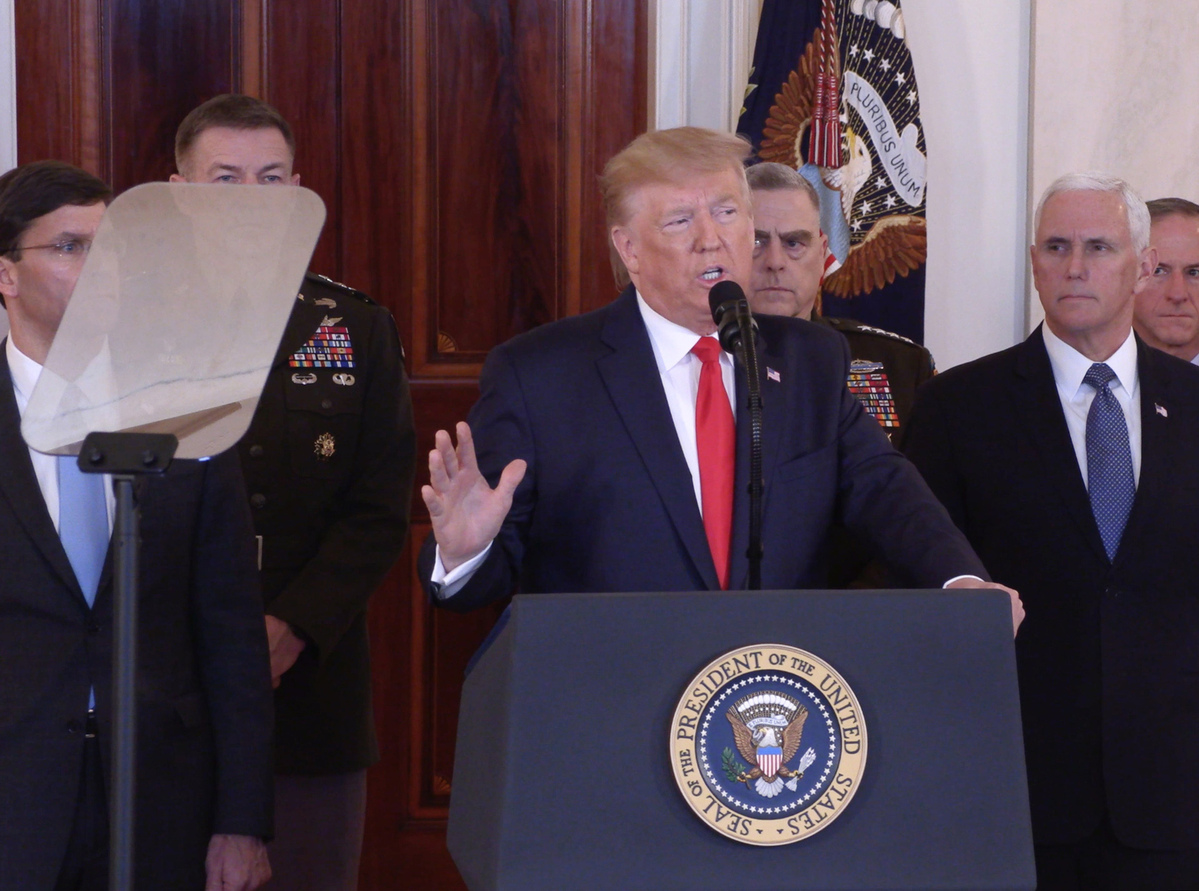Onus on Washington to defuse tensions
By Shen Dingli | China Daily | Updated: 2020-01-11 09:36

Despite both the United States and Iran downplaying the hostilities after a US drone attack killed Iranian general Qassem Soleimani in Baghdad on Jan 3 and Iran fired several missiles at two US military bases in Iraq on Tuesday, tensions in the Middle East remain very high.
The West, the US in particular, had been accusing Iran of carrying out nuclear research not only for civil, peaceful use but also to fulfill its military ambitions. Iran not only denied the charges but also signed the nuclear deal with the five permanent members of the UN Security Council plus Germany and the European Union in 2015, allowing International Atomic Energy Agency officials to inspect its nuclear facilities and agreeing to not enrich uranium beyond a limit in exchange for easing of US and international sanctions. Subsequently, international nuclear inspectors confirmed that Teheran had been abiding by the promises it made in the nuclear deal.
Yet the US not only pulled out of the 2015 Iran nuclear deal but also re-imposed sanctions on Iran. Which heightened US-Iran tensions, leading to the present situation.
As part of international law, inter-country rivalry should not lead to the targeted killing of a rival's leader. But the US claims that as part of its "war on terror", especially "warranted pre-emption" strategy, it is justified in killing Soleimani. Yet the US has not given any evidence that necessitated such an action.
Iran responded by firing several missiles at the US bases in Al-Assad and Irbil. And although the US has said no one was killed in the missile attacks, it is still assessing the damage. With the US and Iran locked in confrontation, there is general pessimism over the situation and fear that it could worsen.
Although Washington has played down the missile attacks, one cannot completely rule out a US counterstrike. Some US congressmen have already said that Iran's missile attacks are a call to war. In fact, earlier the US president said he had already selected 52 sites in Iran as targets. And if, in case, the US does launch a counterstrike, Iran is likely to respond again, raising the tensions even higher.
Yet neither Iran nor the US wants a war. Basically, the US administration is not interested in being mired in too many regional crises. Despite its disengagement policy, however, the US administration cannot accept the killing of Americans. The attack on a US base in Iraq late last year that led to the killing of an American civilian contractor might have prompted the White House to target Soleimani. The US believes that Soleimani was responsible for the killing of the American contractor.
The US expected Iran to respond in some way or the other to the drone attack that killed Soleimani. Perhaps it also expected the Iranian response to be "proportional". Which suggests the US is displaying its cutting-edge military technology while showing it is prepared to deal with the domestic and international criticism against its "targeted pre-emption".
Soleimani was one of Iran's ace military commanders, so his death is a huge blow to Iran's national and strategic interests. Coupled with this fact, the rising sea of anti-US protests across Iran prompted Teheran to respond to Soleimani's death. And it chose Al-Assad, the biggest US Air Force base in Iraq, and Irbil, a smaller US base that focuses on intelligence operation, as targets.
The Al-Assad base is huge, so it will take many missiles to cause substantial damage. Despite Iran firing about 10 missiles on the Al-Assad base, the actual damage appears to be limited. But this could also suggest Iran's military response was "measured and proportionate"-and more importantly, that it has "concluded" its response, meaning Iran does not want a war.
Although there is a world of difference between the US and Iran in terms of military power, the Iranian leaders have to respond to any US provocation. If the US' early report of zero casualties at the Al-Assad and Irbil bases is true, it would give the White House a good reason not to take any further action.
The world is keeping a close watch on Iran's nuclear program after Soleimani's death. Since the US has already withdrawn from the nuclear deal and, after Soleimani's killing, Iran said it would no longer abide by the restrictions the 2015 deal imposed on its nuclear program, regional and global concerns over Iran's nuclear ambitions have risen again.
As China has high stakes in the Middle East, instability and uncertainty in the region, especially the Persian Gulf, would threaten its interests. China has urged the US to use peaceful means to resolve its differences with Iran, while asking all other relevant parties to exercise maximum self-restraint so that the situation does not spiral out of control. We hope better sense prevails on Washington and Teheran, and they do not make any move that would escalate the already high tensions.
The author is a professor at and former executive dean of the Institute of International Studies, Fudan University. The views don't necessarily represent those of China Daily.
























